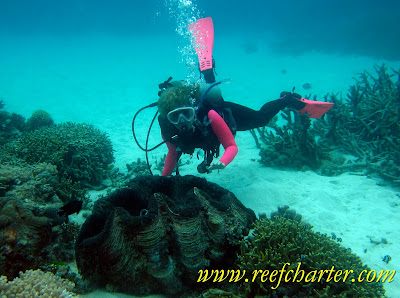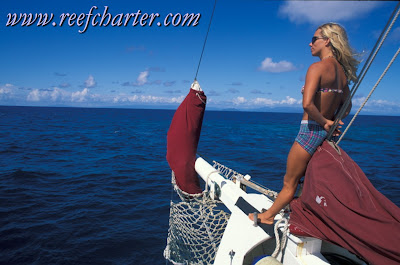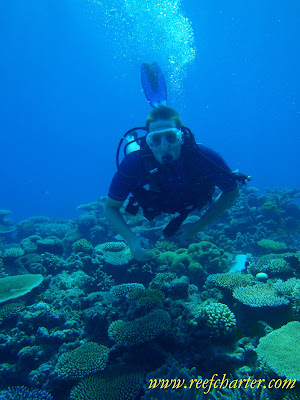We do many things onboard our boats to make sure we minimize our possible environmental impact. That means you can enjoy your diving and snorkeling on the Great Barrier Reef with the knowledge you are not impacting the reef in any detrimental way. One of the things we often talk to our guests about is the use of batteries instead of generators to provide power while we are at the reef.
By capturing energy that would otherwise be wasted during the normal operations of running the engines we charge our extensive battery banks. This allows our snorkelers and scuba divers to enjoy the reef, sunsets and sleep without the noise of a generator in the background. We then recycle the batteries after several years, and eliminating the generator decreases the use of oil and fossil fuels, as well as carbon emissions. A win for both the environment and your travel experience.
So when you are planning your next scuba diving trip to the Great Barrier Reef think about the best way to experience the reef, with only the noise of the waves and birds. If you decide to book with us it’d be our privilege to show you the beauty of this natural wonder…
Category: Informational
We Want to Show You the Best Place to Work
With the biggest natural wonder in the world as our office and playground we lead a privileged existence. We get to experience the magnificent beauty of the Great Barrier Reef and marine life from the smallest nudibranch or shrimp to the humpback whales as they make their way north for their winter vacation. We get to scuba dive in warm water alll year round. So It can’t get much better right?
Well it can… One of the best parts of our jobs is introducing people to the wonderful ocean and the wonderous life that lives in it. Meeting people from all around the world, from the person experiencing scuba diving for the first time to the most experienced divers, sharing this natural beauty is truly a rewarding experience.
When we receive reviews and comments like this one as we often do, months after our guests have returned home it really makes our jobs even better. “The group was so happy and I spoke with tour leader and she said that literally this journey change their life!” They are planning on coming back next year as well, so the pressure is on for us to make the trip better… Thanks guys for the feedback and glad we were able to show you mother nature at it’s best.
GBRMPA Media Statement – Grounding of “Shen Neng 1”
MEDIA STATEMENT FROM THE GREAT BARRIER REEF MARINE PARK AUTHORITY
Impacts of the Shen Neng 1 grounding on the Great Barrier Reef
The Great Barrier Reef Marine Park Authority has been working closely with the Australian Maritime Safety Authority and Maritime Safety Queensland under the National Oil Spill Response Plan, since the Chinese registered bulk carrier, Shen Neng 1, ran aground on Douglas Shoals late Saturday.
Great Barrier Reef Marine Park Authority Chairman Dr Russell Reichelt said the incident poses a significant threat to parts of the World Heritage-listed Great Barrier Reef.
“We have observed damage to the Reef from the grounding incident itself, as evidenced by the plume of coral sediment that can be seen around the ship,” he said.
“As soon as it is safe we will conduct a full assessment to determine just how affected the environment around the site is but at the moment the damage is mostly contained to the seabed around the ship.
“There has been some oil that has escaped the vessel and we have used dispersants both yesterday and today to help breakdown the oil and help mitigate any potential impacts on the environment.
“Fortunately, there have been no reports of continuing oil loss and the quantity spilled to date does not pose a significant threat to marine life.
“It is critical now that there is a successful salvage with no further damage to the ship and no loss of oil or its cargo of coal.”
Dr Reichelt said although the Douglas Shoals are submerged reefs, the broad region in which the grounding has occurred include sensitive shallow reefs that are very high in biodiversity.
“Many of these reefs are still recovering from the impact of Cyclone Hamish in early 2009.
“Any further risk to the coral reefs in the region must be removed as quickly and as safely possible.
“In the area of the grounding there are deep shoals and reefs with diverse benthic communities including hard and soft corals, gorgonians and sea whips.”
Dr Reichelt said that planning is underway for all eventualities, including the risk that if more oil escapes, it could come ashore at sensitive sites along the coast such as Cape Clinton. This is a sensitive national park area near Shoalwater Bay, with internationally recognised wetlands, seagrass meadows, mangroves, a large green turtle and dugong population and migratory birds.
“It is still relatively early days in terms of assessing any environmental damage. We will know more about any potential damage to the Reef in coming days and weeks.”
The Environment Protection Minister the Peter Garrett announced today the formation of a Scientific Panel to assess any environmental damage and to inform options for the ship’s removal.
—————————————————————–
We can only hope that the best efforts are made to minimize any damage caused, and the oil and coal cargo are dealt with quickly.
10 Tips for Seeing the Most While You Scuba Dive
Seeing many scuba divers from all around the world we get to educate our guests on the best way to experience the wonders of the Great Barrier Reef. So to help everyone out wherever you are we put together these tips to help you see more and experience a more interactive diving experience. The best way to see any dive site is with a guide who knows the area and the native wildlife or coral formations in the area. Don’t be afraid to ask them about the site or tell them what you are interested in.
1. Relax and take things slowly when you dive. Remember you are a stranger with lots of bubbles in the underwater world, so by relaxing and not appearing as a threat you will get more fish remaining for you to enjoy.
2. You are in the homes of the fish, turtles and other marine life that you are looking at. Respect that as you would a friends house. Do not disturb the natural surroundings, avoid kicking up sand and definitely not the coral. So practice your buoyancy away from the reef. Give the fish and reef some distance between you and them about 3ft or 1metre.
3. Do not poke, prod or harass the fish. This can be dangerous to their health and sometimes yours. They will also swim away and maybe relocate so other divers will not get to see them later.
4. Always allow the marine life a clear exit path. Make sure you and your dive buddy or group stay to one side and do not surround the animal you are looking at. If the fish or turtle doesn’t feel threatened it will remain for longer and allow you a better experience.
5. Do not feed the fish, apart from it being bad for the natural ecosystem, you do not get to see the natural behaviour of fish if they are being attracted to divers for the food.
6. Move along slowly in the water and pay close attention to the seascape around you. This helps your navigation but more importantly gives you time to really pay attention to the smaller creatures such as beautiful nudibranchs. Initially frightened fish may pop back out or come back to take a closer look at you.
7. Get into routines for checking your gauges. The best equipment designers in the world not make gauge better looking then the reef that surrounds you, so spending time fiddling with your gauges unnecessarily is time wasted. You can play with your dive computer on the boat as much as you want.
8. Spend some time before you get in the water and on the surface to double check you are comfortable with your equipment. Spending time “playing” with your dive gear underwater distracts you form the dive and also makes you consume air more rapidly.
9. Don’t be afraid to stop in a spot to look more closely and examine the coral formations for starfish, crabs and other beauties that make their homes under the coral. Again relax and practice your buoyancy.
10. Stick with your buddy and take the time to point out the cool things you have found. Four eyes are better then two. Agree with your buddy before you dive on some certain types of marine life that you are interested in. By looking at the same type of marine life you both will focus on areas likely to have the creatures.
Most of all have fun, don’t be nervous and we hope to see you diving on the Great Barrier Reef shortly.


